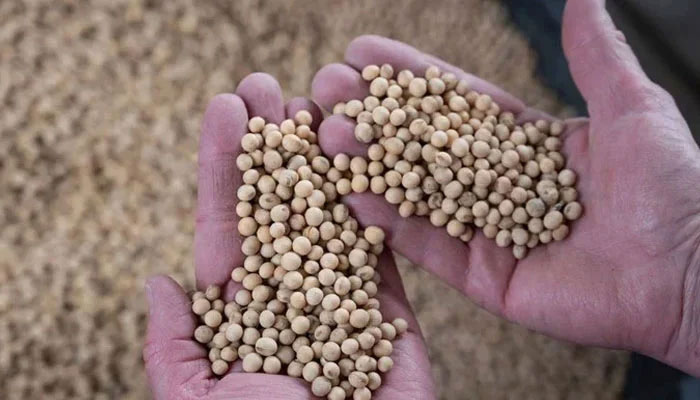On PM’s orders Govt shuts down 392 seed firms in quality purge
Third-party audit played critical role in identifying non-compliant firms, leading to their immediate closure
ISLAMABAD: Pakistan has shut down 392 seed companies for failing to meet regulatory standards, officials said Thursday, as the government, acting on Prime Minister Shehbaz Sharif’s directive, moves to curb declining crop yields blamed on substandard seeds.
The crackdown, ordered by the premier, aims to ensure farmers have access to certified, high-yield seeds amid growing concerns over food security and economic stability.
For years, farmers have complained that low-quality seeds fail to deliver promised yields, contributing to declining harvests in key crops. Agriculture, which accounts for nearly 20 percent of Pakistan’s GDP and employs a large portion of the population, has been struggling due to subpar inputs, including ineffective seeds. The government’s latest intervention seeks to reverse the trend and enhance productivity, officials said.
The decision was finalized during the second Board of Governors meeting of the recently formed National Seed Development and Regulatory Authority (NSDRA), chaired by Federal Minister for National Food Security and Research Rana Tanveer Hussain. Officials emphasized the need for stricter oversight to eliminate unregulated suppliers and ensure that only certified seeds reach the market.
A third-party audit played a critical role in identifying non-compliant firms, leading to their immediate closure. The Federal Seed Certification Department and NSDRA briefed the minister on their action plan, reinforcing the government’s commitment to strict enforcement.
The government will take tough decisions to improve agriculture in the long run, Hussain said, adding that ensuring high-quality seeds is crucial for national food security.
Experts warn that without urgent improvements, Pakistan’s reliance on imported wheat, edible oils, and pulses will continue to rise, further straining foreign reserves and increasing food insecurity risks.
-
 ICE Agents 'fake Car Trouble' To Arrest Minnesota Man, Family Says
ICE Agents 'fake Car Trouble' To Arrest Minnesota Man, Family Says -
 Camila Mendes Reveals How She Prepared For Her Role In 'Idiotka'
Camila Mendes Reveals How She Prepared For Her Role In 'Idiotka' -
 China Confirms Visa-free Travel For UK, Canada Nationals
China Confirms Visa-free Travel For UK, Canada Nationals -
 Inside Sarah Ferguson, Andrew Windsor's Emotional Collapse After Epstein Fallout
Inside Sarah Ferguson, Andrew Windsor's Emotional Collapse After Epstein Fallout -
 Bad Bunny's Star Power Explodes Tourism Searches For His Hometown
Bad Bunny's Star Power Explodes Tourism Searches For His Hometown -
 Jennifer Aniston Gives Peek Into Love Life With Cryptic Snap Of Jim Curtis
Jennifer Aniston Gives Peek Into Love Life With Cryptic Snap Of Jim Curtis -
 Prince Harry Turns Diana Into Content: ‘It Would Have Appalled Her To Be Repackaged For Profit’
Prince Harry Turns Diana Into Content: ‘It Would Have Appalled Her To Be Repackaged For Profit’ -
 Prince William's Love For His Three Children Revealed During Family Crisis
Prince William's Love For His Three Children Revealed During Family Crisis -
 Murder Suspect Kills Himself After Woman Found Dead In Missouri
Murder Suspect Kills Himself After Woman Found Dead In Missouri -
 Sarah Ferguson's Plea To Jeffrey Epstein Exposed In New Files
Sarah Ferguson's Plea To Jeffrey Epstein Exposed In New Files -
 Prince William Prepares For War Against Prince Harry: Nothing Is Off The Table Not Legal Ways Or His Influence
Prince William Prepares For War Against Prince Harry: Nothing Is Off The Table Not Legal Ways Or His Influence -
 'How To Get Away With Murder' Star Karla Souza Is Still Friends With THIS Costar
'How To Get Away With Murder' Star Karla Souza Is Still Friends With THIS Costar -
 Pal Reveals Prince William’s ‘disorienting’ Turmoil Over Kate’s Cancer: ‘You Saw In His Eyes & The Way He Held Himself’
Pal Reveals Prince William’s ‘disorienting’ Turmoil Over Kate’s Cancer: ‘You Saw In His Eyes & The Way He Held Himself’ -
 Poll Reveals Majority Of Americans' Views On Bad Bunny
Poll Reveals Majority Of Americans' Views On Bad Bunny -
 Wiz Khalifa Thanks Aimee Aguilar For 'supporting Though Worst' After Dad's Death
Wiz Khalifa Thanks Aimee Aguilar For 'supporting Though Worst' After Dad's Death -
 Man Convicted After DNA Links Him To 20-year-old Rape Case
Man Convicted After DNA Links Him To 20-year-old Rape Case




